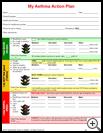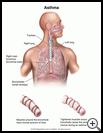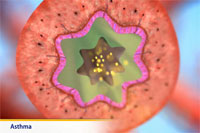
Status Asthmaticus
What is status asthmaticus?
Status asthmaticus is a severe asthma attack that does not respond to the usual treatment. Status asthmaticus is a medical emergency.
What is the cause?
Asthma is a chronic (long-lasting) lung disease in which the lining of the airways of the lungs is swollen or inflamed. The airways are also very sensitive to certain irritants or "triggers." An asthma trigger can be something your child is allergic to such as pollen, animal dander, or house dust. A trigger can also be an irritant such as tobacco smoke, cold air, or a virus in the nose or lung. When the airways react to a trigger, the muscles around the airways tighten and the lining of the airways swells and produces thick mucus. This causes the airway to narrow and makes it harder to breathe. This breathing difficulty is called an asthma attack.
Children whose asthma is not well controlled are most at risk for status asthmaticus.
What are the symptoms?
The symptoms of status asthmaticus are:
- extreme trouble breathing
- little or no breath sounds
- inability to speak
- bluish tinge to the skin or lips
- heavy sweating
- unconsciousness
Coughing and wheezing are common symptoms of asthma, however a child with status asthmaticus may not have enough airflow to be able to cough or wheeze.
How is it diagnosed?
A healthcare provider will review your child’s symptoms, ask about medical history, and examine your child. Your child will also have tests to measure the oxygen in the blood.
How is it treated?
Children with status asthmaticus need to be hospitalized. Some children need to be treated in a pediatric intensive care unit (PICU).
Your child will be given oxygen to increase blood oxygen levels. This is usually given through a face mask. Rarely a child will need a breathing tube inserted to breath for the child. He or she will be treated with an inhaled or IV medicine to open the airways. Your child will receive steroid medicines and other medicines to reduce inflammation, relax muscle spasms, and prevent mucus buildup.
How can I prevent status asthmaticus?
Status asthmaticus is very serious, and you need learn what triggers are most severe for your child. Try to avoid the substances that trigger your child's asthma attacks. It is important to avoid these triggers if at all possible, and to get care quickly if you cannot avoid them.
When should I call my child's healthcare provider?
Call IMMEDIATELY if your child:
- has bluish lips or skin
- is having trouble breathing
- has wheezing that has not improved after the second dose of asthma medicine
- has a peak flow rate is less than 50% of the personal best
Call during office hours if:
- You have other questions or concerns.
Last modified: 2010-01-08
Last reviewed: 2010-11-29



